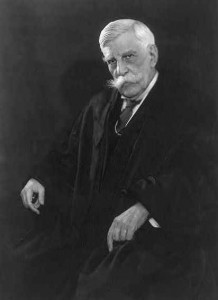Judge Richard Posner has written of Oliver Wendell Holmes, Jr. that he was and is “the preeminent figure in the history of American law.”[1] Prof. Bill Long has written here that Holmes “has taken on symbolic or iconic status. Well, it might be more accurate to state that he holds semi-divine status in American law.”
These statements line up with the way that I viewed Justice Holmes for a good part of my life. I thought of him as one of the greatest lawyers of all time. Further, it seems that most people in the academy (and the legal community?) seem to want to make sure to present Holmes in this fashion and perpetuate his semi-divinity.[2] That is really interesting considering what Holmes really believed and attempted to implement in American law to the extent that he possibly could.
The following quotes from Holmes’s own writings will give you an idea of what he really believed. I am quoting them from Prof. Alschuler’s article entitled “From Blackstone to Holmes: The Revolt Against Natural Law.”[3] The entire article is well done and worth reading in its entirety.
Prof. Alschuler writes:
Holmes earlier had observed, “[A]ll law means I will kill you if necessary to make you conform to my requirements.”
Holmes’s dismissal of natural law reflected his deep skepticism about most things:
[M]y bet is that we have not the kind of cosmic importance that the parsons and philosophers teach. I doubt if a shudder would go through the spheres if the whole ant heap were kerosened.
I see no reason for attributing to a man a significance different in kind from that which belongs to a baboon or to a grain of sand.
I wonder if cosmically an idea is any more important than the bowels.
I think that the sacredness of human life is a purely municipal ideal of no validity outside the jurisdiction. I believe that force, mitigated so far as may be by good manners, is the ultima ratio. . . . [E]very society rests on the death of men. . . .
. . .
Holmes apparently could not envision any basis for political, social, or personal action other than self-interest. He wrote, “[T]he condition of others is primarily their business and certainly is beyond our power. Whence the futility of the command to love one’s brother as oneself.” He also observed:
I don’t see why we mightn’t as well invert the Christian saying and hate the sinner but not the sin. Hate. . . imports no judgment. Disgust is ultimate and therefore as irrational as reason itself–a dogmatic datum. The world has produced the rattlesnake as well as me; but I kill it if I get a chance, as also mosquitos, cockroaches, murderers, and flies. My only judgment is that they are incongruous with the world I want; the kind of world we all try to make according to our power.
…
In a letter to Felix Frankfurter, Holmes expressed irritation with Francis Philbrick, a reviewer of his Collected Legal Papers:
[Philbrick] says, “whatever that may mean” when I say that I don’t think you can do much by tinkering with property without taking in hand life. I meant what I suppose he would think horrible–restricting propagation by the undesirables and putting to death infants that didn’t pass the examination, etc. etc.[4]
Again, there are many more such quotes. Holmes made no effort to hide his radically naturalistic, evolutionary views. I trust that those who read these and other quotes like them will understand the title of this post. Further, it is obvious why the law is in the state it is in given the enormous influence of a man who believed what Holmes believed.
[1] Richard A. Posner, The Path Away From the Law, 110 Harv. L. Rev. 1039, 1039 (1997).
[2] I could find almost none of these quotes elsewhere on the Internet via a Google search, which is interesting.
[3] Albert W. Alschuler, From Blackstone to Holmes: The Revolt Against Natural Law, 36 Pepp. L. Rev. 491 (2009)
[4] Id. at 498-501, 503.
